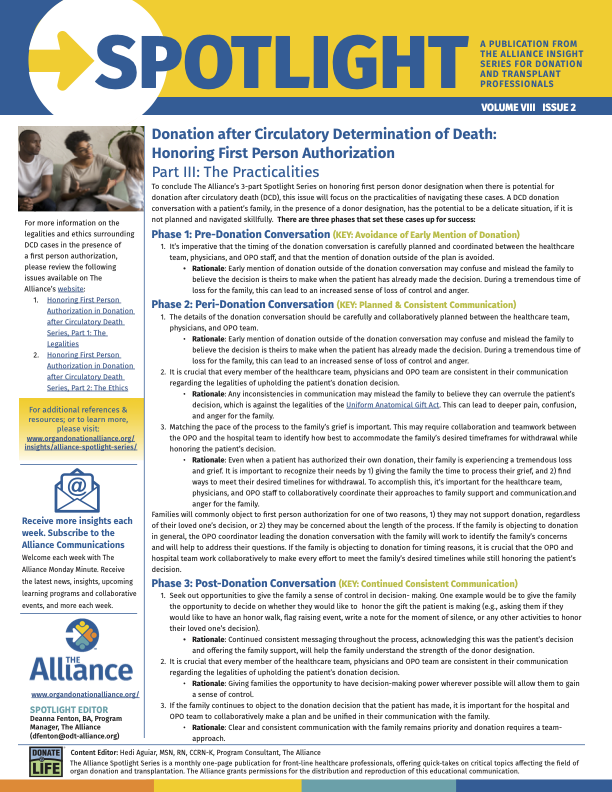To conclude The Alliance’s 3-part Spotlight Series on honoring first person donor designation when there is potential for donation after circulatory death (DCD), this issue will focus on the practicalities of navigating these cases. For more information on the legalities and ethics surrounding DCD cases in the presence of a first person authorization, please review the following issues available on The Alliance’s website:
- Honoring First Person Authorization in Donation after Circulatory Death Series, Part 1: The Legalities
- Honoring First Person Authorization in Donation after Circulatory Death Series, Part 2: The Ethics
Part 3: The Practicalities
A DCD donation conversation with a patient’s family, in the presence of a donor designation, has the potential to be a delicate situation, if it is not planned and navigated skillfully.
There are three phases that set these cases up for success:
Phase 1 – Pre-Donation Conversation
KEY: Avoidance of Early Mention of Donation
- It’s imperative that the timing of the donation conversation is carefully planned and coordinated between the healthcare team, physicians, and OPO staff, and that the mention of donation outside of the plan is avoided.
- Rationale – Early mention of donation outside of the donation conversation may confuse and mislead the family to believe the decision is theirs to make when the patient has already made the decision. During a tremendous time of loss for the family, this can lead to an increased sense of loss of control and anger.
Phase 2 – Peri-Donation Conversation
KEY: Planned & Consistent Communication
- The details of the donation conversation should be carefully and collaboratively planned between the healthcare team, physicians, and OPO team.
- Rationale – A unified and collaborative approach to this conversation avoids confusion and inconsistencies for the family.
- It is crucial that every member of the healthcare team, physicians, and OPO team are consistent in their communication regarding the legalities of upholding the patient’s donation decision.
- Rationale – Any inconsistencies in communication may mislead the family to believe they can overrule the patient’s decision, which is against the legalities of the Uniform Anatomical Gift Act. This can lead to deeper pain, confusion and anger for the family.
- Matching the pace of the process to the family’s grief is important. This may require collaboration and teamwork between the OPO and the hospital team to identify how best to accommodate the family’s desired timeframes for withdrawal while honoring the patient’s decision.
- Rationale – Even when a patient has authorized their own donation, their family is experiencing a tremendous loss and grief. It is important to recognize their needs by 1) giving the family the time to process their grief, and 2) find ways to meet their desired timelines for withdrawal. To accomplish this, it’s important for the healthcare team, physicians, and OPO staff to collaboratively coordinate their approaches to family support and communication.
Families will commonly object to first person authorization for one of two reasons, 1) they may not support donation, regardless of their loved one’s decision, or 2) they may be concerned about the length of the process.
If the family is objecting to donation in general, the OPO coordinator leading the donation conversation with the family will work to identify the family’s concerns and will help to address their questions. If the family is objecting to donation for timing reasons, it is crucial that the OPO and hospital team work collaboratively to make every effort to meet the family’s desired timelines while still honoring the patient’s decision.
Phase 3 – Post-Donation Conversation
KEY: Continued Consistent Communication
- After the donation conversation has occurred and while the case details are being coordinated, it is important that the patient’s decision to donate remains clear and the communication continues to provide the family emotional support without any conflicting messages.
- Rationale – Continued consistent messaging throughout the process, acknowledging this was the patient’s decision and offering the family support, will help the family understand the strength of the donor designation.
- Seek out opportunities to give the family a sense of control in decision-making. One example would be to give the family the opportunity to decide on whether they would like to honor the gift the patient is making (e.g., asking them if they would like to have an honor walk, flag raising event, write a note for the moment of silence, or any other activities to honor their loved one’s decision).
- Rationale – Giving families the opportunity to have decision-making power wherever possible will allow them to gain a sense of control.
- If the family continues to object to the donation decision that the patient has made, it is important for the hospital and OPO team to collaboratively make a plan and be unified in their communication with the family.
- Rationale – Clear and consistent communication with the family remains priority and donation requires a team-approach.







